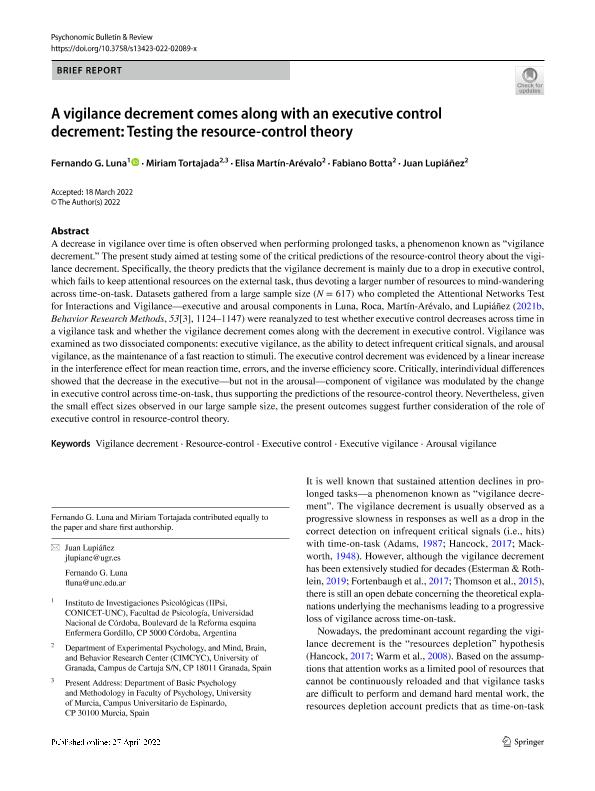Mostrar el registro sencillo del ítem
dc.contributor.author
Luna, Fernando Gabriel

dc.contributor.author
Tortajada, Miriam
dc.contributor.author
Martín Arévalo, Elisa
dc.contributor.author
Botta, Fabiano
dc.contributor.author
Lupiáñez, Juan
dc.date.available
2022-07-19T12:09:35Z
dc.date.issued
2022-04
dc.identifier.citation
Luna, Fernando Gabriel; Tortajada, Miriam; Martín Arévalo, Elisa; Botta, Fabiano; Lupiáñez, Juan; A vigilance decrement comes along with an executive control decrement: Testing the resource-control theory; Springer; Psychonomic Bulletin and Review; 4-2022; 1-13
dc.identifier.issn
1069-9384
dc.identifier.uri
http://hdl.handle.net/11336/162454
dc.description.abstract
A decrease in vigilance over time is often observed when performing prolonged tasks, a phenomenon known as “vigilance decrement.” The present study aimed at testing some of the critical predictions of the resource-control theory about the vigilance decrement. Specifically, the theory predicts that the vigilance decrement is mainly due to a drop in executive control, which fails to keep attentional resources on the external task, thus devoting a larger number of resources to mind-wandering across time-on-task. Datasets gathered from a large sample size (N = 617) who completed the Attentional Networks Test for Interactions and Vigilance—executive and arousal components in Luna, Roca, Martín-Arévalo, and Lupiáñez (2021b, Behavior Research Methods, 53[3], 1124–1147) were reanalyzed to test whether executive control decreases across time in a vigilance task and whether the vigilance decrement comes along with the decrement in executive control. Vigilance was examined as two dissociated components: executive vigilance, as the ability to detect infrequent critical signals, and arousal vigilance, as the maintenance of a fast reaction to stimuli. The executive control decrement was evidenced by a linear increase in the interference effect for mean reaction time, errors, and the inverse efficiency score. Critically, interindividual differences showed that the decrease in the executive—but not in the arousal—component of vigilance was modulated by the change in executive control across time-on-task, thus supporting the predictions of the resource-control theory. Nevertheless, given the small effect sizes observed in our large sample size, the present outcomes suggest further consideration of the role of executive control in resource-control theory.
dc.format
application/pdf
dc.language.iso
eng
dc.publisher
Springer

dc.rights
info:eu-repo/semantics/openAccess
dc.rights.uri
https://creativecommons.org/licenses/by/2.5/ar/
dc.subject
AROUSAL VIGILANCE
dc.subject
EXECUTIVE CONTROL
dc.subject
EXECUTIVE VIGILANCE
dc.subject
RESOURCE-CONTROL
dc.subject
VIGILANCE DECREMENT
dc.subject.classification
Otras Psicología

dc.subject.classification
Psicología

dc.subject.classification
CIENCIAS SOCIALES

dc.title
A vigilance decrement comes along with an executive control decrement: Testing the resource-control theory
dc.type
info:eu-repo/semantics/article
dc.type
info:ar-repo/semantics/artículo
dc.type
info:eu-repo/semantics/publishedVersion
dc.date.updated
2022-07-04T19:28:51Z
dc.identifier.eissn
1531-5320
dc.journal.pagination
1-13
dc.journal.pais
Estados Unidos

dc.description.fil
Fil: Luna, Fernando Gabriel. Universidad Nacional de Córdoba. Instituto de Investigaciones Psicológicas. - Consejo Nacional de Investigaciones Científicas y Técnicas. Centro Científico Tecnológico Conicet - Córdoba. Instituto de Investigaciones Psicológicas; Argentina
dc.description.fil
Fil: Tortajada, Miriam. Universidad de Murcia. Facultad de Psicologia. Departamento de Psicologia Basica y Metodologica; España. Universidad de Granada. Centro de Investigación Mente, Cerebro y Comportamiento; España
dc.description.fil
Fil: Martín Arévalo, Elisa. Universidad de Granada. Centro de Investigación Mente, Cerebro y Comportamiento.; España
dc.description.fil
Fil: Botta, Fabiano. Universidad de Granada. Centro de Investigación Mente, Cerebro y Comportamiento.; España
dc.description.fil
Fil: Lupiáñez, Juan. Universidad de Granada. Centro de Investigación Mente, Cerebro y Comportamiento.; España
dc.journal.title
Psychonomic Bulletin and Review
dc.relation.alternativeid
info:eu-repo/semantics/altIdentifier/doi/http://dx.doi.org/10.3758/s13423-022-02089-x
dc.relation.alternativeid
info:eu-repo/semantics/altIdentifier/url/https://link.springer.com/article/10.3758/s13423-022-02089-x
Archivos asociados
